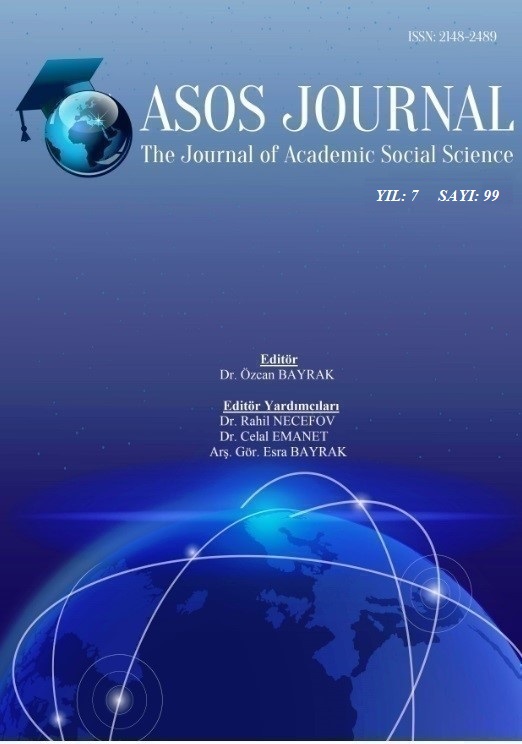Author :
Abstract
Kierkegaard, çağının hâkim düşünce geleneği karşısındaki sorgulayıcı tavrı ve insanın yaşam alanına dönük önemli düşünceleri ile felsefe tarihinde yerini almıştır. O diyalektik ve ironik yöntemi, edebi üslupla birleştirdiği eserleri ile okuyucuyu, kendi yaşamına dönük içsel bir sorgulamaya çağırmaktadır. Onun özellikle Kant ve Hegel’in aklı merkeze alan felsefeleri karşısında geliştirdiği, bireyin varoluşunu anlamlandırmaya yönelik öznel hakikat anlayışı, bizi yeniden insanın doğasını düşünmeye zorlamaktadır. Kierkegaard, bir öğreti niteliği taşımayan ahlak anlayışında, evrensellik ve akılsallık ilkelerini tartışmaya açar. O yaşam alanında bireyin içsel yönelimi sonucu yaptığı seçim ve eylemleri, kendi hakikatine ulaşması noktasında değerli bulur. Bu çalışmada Kierkegaard felsefesine bütünlüklü bir yapı kazandıran varoluş alanları içerisinde bireyin etik konumu ele alınırken, ‘etiğin askıya alınışı’ problemi ile Kierkegaard’ın hedef olduğu eleştiriler değerlendirilecektir. Evrensel etik değerler karşısında bireyin Tanrı huzurunda varoluşunu öne çıkaran Kierkegaard’ın yaşam alanına dönük radikal görüşleri, yaşayan somut bir birey olabilmenin çağımızda
Keywords
Abstract
Kierkegaard has taken its place in the history of philosophy with its questioning attitude towards the dominant tradition of thought of the age and important thoughts about human life. He calls the reader to an internal questioning of his own life with his works that combine dialectic and ironic method with literary style. His understanding of subjective truth, for making existence of individual meaningful, which he developed especially against Kant and Hegel’s ratio-centered philosophies, compels us to consider the nature of human again. Kierkegaard leads the discussion of the principles of universality and rationality in the non-doctrinal morality. He finds valuable that individual's choices and actions as a result of internal orientation in the living space, in terms of reaching his own truth. In this study, while examining the ethical position of the individual within the realms of existence that gives Kierkegaard philosophy an integrated structure, ‘the problem of suspension of ethics’ and the criticisms that Kierkegaard is targeted will be evaluated. Kierkegaard's radical views on the field of life, which emphasize the existence of the individual in the presence of God in the face of universal ethical values, will continue to be discussed with the quality of balance in the face of the lost importance of being a concrete individual in our age.
Keywords
- Anderson, S. L. (2014). Kierkegaard Üzerine. (G. Gürdal, Çev.) Ankara: Sentez Yayıncılık.
- Barrett, W. (2003). İrrasyonel İnsan, (S. Özer, Çev.) Ankara: Hece Yayınları.
- Blackham, H. J. (2012). Altı Varoluşçu Düşünür. (E. Uşşaklı, Çev.) Ankara: Dost Kitabevi
- Bozkurt, N. (2011), Hegel. İstanbul: Say Yayınları.
- Broothers, R. (1999).'Ethics of Ethics, Law of Laws': Kierkegaard, Levinas and the Aporia of Substantive Identity, Sophia, (38-2), (54-68).
- Cauly, O. (2006). Kierkegaard, (I. Ergüden, Çev.) Ankara: Dost Kitabevi Yayınları.
- Copleston, F. (2010). Hegel, (A. Yardımlı, Çev.) İstanbul: İdea Yayınları.
- Evans, C. S. (2006). Kierkegaard On Faith And The Self, Collected Essays, Texas USA: Baylor University Press.
- Friedman, R.Z. 1986, Kant and Kierkegaard: TheLimits of Reason and the Cunning of Faith, İnternational Jorurnal for Philosophy of Religion, (19), 3-22.
- Gödelek, K. (2010). Kierkegaard. İstanbul: Can Yayınları.
- Hannay, A. (2001). Kierkegaard, A Biography. Cambridge, UK: Cambridge University Press.
- Hegel, G. W. F. (2003). Tarihte Akıl, (Ö. Sözer, Çev.) İstanbul: Kabalcı Yayınevi.
- Hegel, G. W.F. (2015). Tinin Görüngübilimi, (A. Yardımlı, Çev.) İstanbul: İdea Yayınları.
- Kant I.(1999). Pratik Aklın Eleştirisi, (İ. Kuçuradi, Ü. Gökberk, F. Akatlı, Çev.), Ankara: Tür- kiye Felsefe Kurumu Çeviri Dizisi-2.
- Kierkegaard, S. (1992). Either/Or, A Fragment of Life, (A. Hannay, Trans). London, England: PenguinBooks.
- Kierkegaard, S. (2000). Kahkaha Benden Yana. (N. Çatlı, Çev.) İstanbul: Ayrıntı Yayınları.
- Kierkegaard, S. (2005). Günlüklerinden ve Makalelerden Seçmeler. (İ. Kapaklıkaya, Çev.) İstanbul: Anka Yayıncılık.
- Kierkegaard, S. (2009). Concluding Unscientific Postscript, (A. Hannay, Trans).Newyork, UK: Cambridge UniversityPress.
- Kierkegaard, S. (2010). Bilimsel Olmayan Sonlandırıcı Notlar, K. Gödelek ‘Kierkegaard’ için- de (s.191-257) İstanbul: Say Yayınları.
- Kierkegaard, S. (2011). Korku ve Titreme. (İ. Kapaklıkaya, Çev.) İstanbul: Ağaç Kitabevi
- Kierkegaard, S.(2014). Tekerrür, Deneysel Psikolojiye Tehlikeli Bir Teşebbüs.(Z. Talay, Çev.). İstanbul: Pinhan Yayınları.
- Kierkegaard, S. (2015). Kaygı Kavramı. (T. Armaner, Çev.) İstanbul: Türkiye İş Bankası
- Kierkegaard, S. (2016).Kendinizi Sevmeyi Unutmayın. (E. M. Bozer, Çev.) İstanbul: Aylak Adam Yayınları.
- Kierkegaard, S. (2017). Şimdiki Çağ: Başkaldırının Ölümü Üzerine. (B. Tokdemir, Çev.) İstan- bul: Paris Yayınları.
- Kurtoğlu . D. T, (2008). Kierkegaard'da Varoluşçu Mantık Olarak "Ya/Ya Da" Hegel'in Mantığı İle Benzerlikler Ve Farklılıklar, Felsefe Dünyası, (37), (159-172).
- Kurtoğlu, D.T. (2016), Aşk ve Sessizlik Kavramlarında Bulduğum Kierkegaard ve Estetize Dönüşümler, Özne Dergisi, (25), (75-108).
- Kwak, D.J. (2001), A New Formulation of the Ethical Self through Kierkegaard's Notion of Subjectivity: In Search of a New Moral Education, Asia Pasific Education Review, (2,1), (3-9).
- MacIntrye, A. (2001). AlasdairMacIntrye, Ethik’in Kısa Tarihi, Homerik Çağdan Yirminci Yüzyıla, (H. Hünler&S. Z. Hünler, Çev.), İstanbul: Paradigma Yayınları.
- Maybee, J. E. (1996), Kierkegaard on the Madness of Reason, Man and World, Continental Philosopy Review, (29), 387-406.
- Marino, G.D. (2001). Kierkegaard In The Present Age, Milwaukee USA: Marquette University Press.
- Moore, C.E. (2001). Provocation, SpritualWrittings Of Kierkegaard, http://www.bruderhof.com/e-books/ Provocations.htm.
- Morris, T.F. (1989), Kierkegaard on Despair and the Eternal, Sophia, (28), (21-30).
- Mengüşoğlu, T. (2014). Kant ve Scheler'de İnsan Problemi, Ankara: Doğu Batı Yayınları
- Poole, R. (1998). "The Unknown Kierkegaard: Twentieth Century Receptions", (ed. A. Hanna- yand G. D. Marino), Kierkegaard, , s.48-76, Cambridge UK: Cambridge UniversityPress.
- Taşdelen, V. (2004). Kierkegaard'ta Benlik ve Varoluş. Ankara: Hece Yayınları.
- Türkyılmaz, Ç. (2016). Bunalım Çağı, KierkegaardMarx, Nietzche, Ankara: Bibliotech Yayınla- rı.





